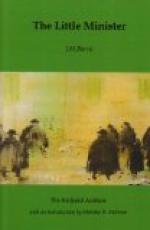“But the most astounding thing has yet to be telled,” went on Elspeth. “The minister shook himsel’ like one wakening frae a nasty dream, and he cries in a voice of thunder, just as if he was shaking his fist at somebody—”
“He cries,” Birse interposed, cleverly, “he cries, ’You will find the text in Genesis, chapter three, verse six.’”
“Yes,” said Elspeth, “first he gave out one text, and then he gave out another, being the most amazing thing to my mind that ever happened in the town of Thrums. What will our children’s children think o’t? I wouldna hae missed it for a pound note.”
“Nor me,” said Waster Lunny, “though I only got the tail o’t. Dominie, no sooner had he said Genesis third and sixth, than I laid my finger on Ezra. Was it no provoking? Onybody can turn up Genesis, but it needs an able-bodied man to find Ezra.”
“He preached on the Fall,” Elspeth said, “for an hour and twenty-five minutes, but powerful though he was I would rather he had telled us what made him gie the go-by to Ezra.”
“All I can say,” said Waster Lunny, “is that I never heard him mair awe-inspiring. Whaur has he got sic a knowledge of women? He riddled them, he fair riddled them, till I was ashamed o’ being married.”
“It’s easy kent whaur he got his knowledge of women,” Birse explained, “it’s a’ in the original Hebrew. You can howk ony mortal thing out o’ the original Hebrew, the which all ministers hae at their finger ends. What else makes them ken to jump a verse now and then when giving out a psalm?”
“It wasna women like me he denounced,” Elspeth insisted, “but young lassies that leads men astray wi’ their abominable wheedling ways.”
“Tod,” said her husband, “if they try their hands on Mr. Dishart they’ll meet their match.”
“They will,” chuckled the post. “The Hebrew’s a grand thing, though teuch, I’m telled, michty teuch.”
“His sublimest burst,” Waster Lunny came back to tell me, “was about the beauty o’ the soul being everything and the beauty o’ the face no worth a snuff. What a scorn he has for bonny faces and toom souls! I dinna deny but what a bonny face fell takes me, but Mr. Dishart wouldna gie a blade o’ grass for’t. Ay, and I used to think that in their foolishness about women there was dagont little differ atween the unlearned and the highly edicated.”
The gossip about Gavin brought hitherto to the schoolhouse had been as bread to me, but this I did not like. For a minister to behave thus was as unsettling to us as a change of Government to Londoners, and I decided to give my scholars a holiday on the morrow and tramp into the town for fuller news. But all through the night it snowed, and next day, and then intermittingly for many days, and every fall took the school miles farther away from Thrums. Birse and the crows had now the glen road to themselves, and even Birse had twice or thrice to bed with me. At these times had he not been so interested in describing his progress through the snow, maintaining that the crying want of our glen road was palings for postmen to kick their feet against, he must have wondered why I always turned the talk to the Auld Licht minister.




